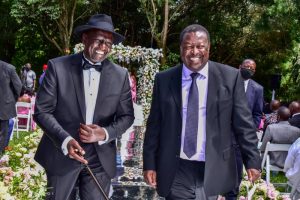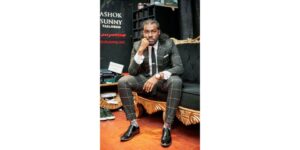When he gave his daughter away last May at her wedding to Nigerian Dr Alexander Ezenagu, President William Ruto was dressed to the nines. For the lavish, invite-only event held at his private residence in Karen, Ruto stunned in a black bespoke suit, a black bow tie, black pair of shoes, a black fedora cap and a black bakora (walking stick).
A white, long-sleeved shirt provided contrast and completed the classy look.
The outfit caught the attention of netizens, with many wanting to know who styled him up so well. It turns out that the person responsible for Ruto’s catchy attire was 32-year-old fashion designer and stylist, Ashok Sunny.

[Photo: Courtesy]
To this day, it turns out, age-old techniques dating back hundreds of years to around 1538 are used to make bespoke suits. While fashion and style may change, the modus operandi remains the same: starting from scratch, the client’s measurements and posture are drafted onto brown paper using tape measure, a set square, chalk and a very keen eye.
The suit is then cut by Sunny or any of his 20 tailors and the first basted fitting is created (the suit is temporarily stitched together with white basting thread for the client to try on); the garment is checked over for fit and style before the basted fitting is ripped down to its individual pieces, re-cut, re-sized and any final adjustments made. The end product is the kind of master creation that Ruto wore to his daughter’s wedding.

“Made to measure is what the majority of tailors do in Kenya using machines, and his is what they describe as bespoke. But bespoke tailoring is the art of tailoring a garment from scratch to finish, by hand,” says Sunny, who is the CEO of Ashok Sunny Tailored Limited.
On average, drafting the master pattern and cutting the suit takes up to half a day, without interruption. “Anyone who claims to make a bespoke suit within a week is a con. From start to finish, the blazer will take you 50 hours, a trouser 25 hours, then you do over 5,000 hand stitches, finishing and fitting. At least three, four weeks for a quality garment,” Sunny says.
Bespoke suits are luxurious, made only from high quality fabrics that require a hand for perfection and not machines for impression. “Depending on the type and quality of fabric, I charge between Sh60,000 to Sh250,000 for a bespoke suit,” he offers. For these suits, the fabric is always wool and could be a super 100 to 200 in quality, a vicuna or a cashmere.
He expounds: “Super 100 will cost Sh60,000, super 120 Sh100,000, super 130 Sh150,000 and so on. The higher the super, the lighter the fabric, and the more the garment will cost. Cashmere can be mixed with wool and the end product will cost between Sh250,000 to Sh1 million. Vicuna is the most expensive fabric in the world, which we don’t have in Kenya.” A square metre of Vicuna is Sh600,000; a suit requires three metres.

“The majority of Kenyan men wear polyester suits; that’s what is available in the market, but they’re heavy and not advisable for our tropical weather. The best quality you can get locally is poly-wool, which is 30 per cent wool.” For his bespoke garments, Sunny ships in fabric from Italy, London, France and Belgium.
When he started the tailoring business in 2013, his vision was to dress everyone. Never in his mind did he ever think he would end up crafting a luxury tailoring brand. With a capital of Sh20,000 borrowed from his mother, the then 22-year-old set up a stall in Nairobi’s Umoja estate, equipped with one sewing machine. He employed an 18-year-old rookie tailor and he was the creative designer. As years went by and he became fashion-omniscient, more enlightened, and his financial muscle strengthened, he narrowed down his client list.
“Yes, when I started I stitched for everyone. Right now the lowest quality we use is poly-wool; we want to maintain a certain quality, which is high-end exclusive.” Though some might fault him for the move, Sunny says it is good for business and signifies his growth.
“When you do the business more, your understanding and perception change. You get to a point where you understand different fabrics, their qualities and various tailoring techniques, depending on the fabric.” He explains.
With the world becoming a global village and the scarcity of quality fabric in Kenya, Ashok saw a good opportunity to change the modus operandi of his brand.
“These days, more and more people are travelling the world than before. They have information, and they know what quality can be found in Bangkok and what they can get in London. But because they cannot travel every time they need a suit, they want someone locally who can offer that service. So I stepped in.”
For clients seeking a bespoke experience on a budget, the Business and IT graduate advises that they use Super 100 to 120 fabric. “This way, if they go into a room where people understand what suits are, you aren’t far off the mark.” But if one cannot afford the bespoke pieces, a good quality made-to-measure poly-wool suit will cost between Sh30,000 to Sh60,000.
Though his garments might sound a little pricey, Sunny is never short of clients. He refutes the notion that his suits are for people in their 40s and above, with high purchasing power. “Not really. Actually, the majority of my clients are from 30 years upwards, mostly in the corporate world, lawyers and youthful parliamentarians.”
He counts among his clients former chief crime buster George Kinoti, 36-year-old Darshan Chandaria, the Group CEO and Director of Chandaria Group, and communications expert and image consultant Mwenesi Musalia, 38.
Out of curiosity, I ask how many bespoke suits he has tailored since the beginning of the year. “Actually that’s data we are currently working on. I am not entirely sure but on average I would say 300 pieces. Bespoke suits are currently our highest moving product. Come January we will expand production, relocate to a bigger space and add more tailors,” Sunny beams.
Credit: Source link